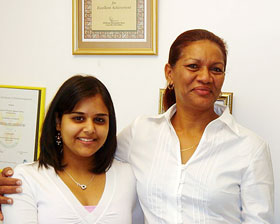  |
| HOME | THIS ISSUE | CALENDAR | GRANTS | BACK ISSUES | < BACK | NEXT > |
Women’s Studies course inspires students to help those in needby Sherry Fisher - October 9, 2006 |
||||
| Sophomore Shahista Ramanand, whose home town is Durban, South Africa, had always been involved in community activities. In high school, she was on the city's youth council, did fund raising for various organizations, and worked on projects to help people living with AIDS and their families. But until she took a course in Women's Studies called "Gender in Global Perspective," she didn't realize how global women's issues are. The course covers a wide variety of issues, from poverty in Africa to violence against women. "I was aware to some extent of what women were going through in the world, particularly in my country of South Africa," says Ramanand, who is majoring in pharmacy. "But I hadn't realized that so many problems existed for women and children in countries like Turkey, China, and India. It made me more aware of these global women's issues and how I would like to become involved. It really sparked an interest." Part of the course requires students to conduct a community action project on a topic discussed in class. "It's designed as a mechanism to take the issues beyond the classroom," says Nancy Naples, interim director of the Women's Studies Program. "It's experiential learning." For her social action project, Ramanand and three other students did a fund-raiser for a South African group fighting violence against women and an organization called Topsy, which provides women infected with HIV and their children with basic skills. Ramanand ordered 500 beaded pins and key rings made by the women and children in Topsy, and sold them on campus to raise money. Her group raised $1,500, which was split between the two organizations. When she returned to South Africa for the summer, she gave the money to the head of the anti-violence group. "My parents have always told me how important it is to give back to the community," Shahista says. "It's a wonderful feeling." Laura Just, a sophomore majoring in education, says the course was her favorite last year. "We learned about gender inequalities, not just here, but all across the world," she says. "We learned how much of a problem it is, and how much people are suffering and are being oppressed." Just's social action project was about practicing safe sex. She constructed a bulletin board in her residence hall dealing with the topic. She also participated in a fund-raising AIDS walk in New Haven.
But she was so moved by the class, she decided to organize a pasta dinner to raise funds for an orphanage in South Africa for children who had lost their parents to AIDS. The fund-raiser, held at her church in North Branford, brought in $1,000. "The class and project opened my eyes so much," she says. Sophomore Eliana Echeverry supported UConn's "Take Back the Night" rally and candlelight vigil against sexual violence. "We promoted it via flyers, gave out pamphlets and encouraged people to come and join," she says. "Chances are if you were not personally affected by sexual abuse, you know someone who was. We are their support." Echeverry says she was moved by the film A Closer Walk , a 2003 documentary about the global AIDS epidemic shown in class. "The interviews were the best because of the way the issues were conveyed," she says. "It had so much more impact than reading something in a book." Echeverry also helped her teaching assistant, Michelle Kaufman, with a teen pregnancy prevention project in Hartford. "We put condoms in barber shops and saloons, to make them more accessible," she says, noting that they also left pamplets about STDs and HIV. "Once you're motivated by something and you have the opportunity to continue doing it, why not?" she adds. "It brings something beneficial to everyone." Kaufman says students became immersed in their social action projects. "As we went through the semester, they became more and more involved," she says. "They learned that they can make a difference."
|
| ADVANCE HOME UCONN HOME |

